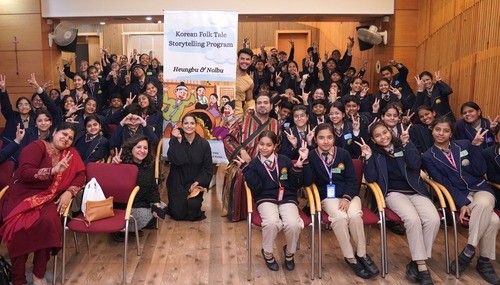Korea’s SEOLLAL culture recreated for New Delhi students at KCCI
Seollal, one of South Korea’s most significant traditional festivals SEOLLAL marks the first day of the Korean lunar calendar.
New Delhi – South Korea’s art and culture promotion arm Korean Cultural Centre India celebrated Seollal, the Korean Lunar New Year, with a vibrant cultural event at its centre in New Delhi on 29th January 2025. The celebration brought together 80 Korean language learners from ASN Senior Secondary School in Mayur Vihar. Seollal, one of South Korea’s most significant traditional festivals, marks the first day of the Korean lunar calendar and is a time for reflection, renewal, and New Year’s greetings.
The event hosted at Korean Cultural Centre India was designed to recreate the authentic experiences typically enjoyed in Korea during the Lunar New Year. The event allowed participants to fully immerse themselves in Korean traditions.
The day’s activities featured Yutnori, a traditional Korean board game, and Phalssireum, an exciting arm-wrestling competition. As many as seven students were adjudged as the winners in their respective games and were given a traditional Korean bookmark as a gift. Besides the exciting games, the students also learned about key customs of Seollal, including Sebae – a deep bow of respect to elders, accompanied by New Year’s greetings.
The students also enjoyed eating Tteokguk, a rice cake soup, that is a special festival dish that is prepared on Seollal. Tteokguk, which consists of broth and white ‘tteok’ (rice cakes), symbolises purity and new beginnings. It is a traditional Korean dish served during Seollal and it holds deep cultural and symbolic significance.
 Eating Tteokguk on Seollal is believed to signify a fresh start to the new year. It represents cleansing oneself of negative energy and starting anew with a clean slate. Tteokguk is not just a meal but a meaningful tradition that captures the essence of Korean culture, history, and values.
Eating Tteokguk on Seollal is believed to signify a fresh start to the new year. It represents cleansing oneself of negative energy and starting anew with a clean slate. Tteokguk is not just a meal but a meaningful tradition that captures the essence of Korean culture, history, and values.
Traditionally, Koreans say that a person “grows a year older” after eating Tteokguk on Seollal. This is tied to the traditional Korean age system, where a person’s age increases not on their birthday but at the start of the Lunar New Year.
Amid all the cultural extravaganza, the highlight of this year’s Seollal celebrations at the Korean Cultural Centre India was the enactment by Indian artists of a Korean folktale – Heungbu and Nolbu.
The folktale narrates the story of two brothers with contrasting personalities and highlights the values of kindness, compassion, and the rewards of virtuous behaviour. It is a very old Korean folktale with no exact date of when it was written and by whom it was written. But it is believed to have been passed on from one generation to another over several hundreds of years in Korea. It is now told as a popular bedtime story to Korean children.
Medhansh Mehta, a student of class 6C at ASN Senior Secondary School said, “I found the play to be amazing and the actors were really good and brought their character to life on the stage. In the beginning, what happened to the younger brother was very cruel, but in the end the result was good for everyone, and they all lived happily ever after. The message of the play was that we should not be greedy and that we should treat our younger brother and everyone else very nicely.”
Theatre artist Imran Khan, who played the lead character of Heungbu, said, “Heungbu and Nolbu is one of the most famous story from Korea. This is a story that is narrated to all the children in the country.
The main reason for this is that the content of the story is incredible. There is a positive take away from it for every child who watches this play. This story is fun and it speaks about friendship, greed, and about relationships.”
Hwang Il Yong, Director of the Korean Cultural Center in India, said, “I hope that this Lunar New Year event, which was specially planned for local secondary school students in India, will help the students feel more familiar with Korean culture. With the popularity of K-pop and Korean dramas, interest in experiencing Korean culture in depth is also increasing in India. This year, we planned to hold a unique event so that Indian students can experience Korean culture in various ways.”


